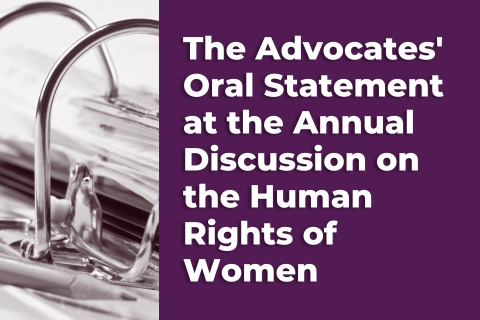The Advocates' Oral Statement at the Annual Discussion on the Human Rights of Women

On June 28, 2024,The Advocates for Human Rights, LBH Masyarakat (Community Legal Aid Institute), and the World Coalition Against the Death Penalty delivered a statement at the 56th regular session of the Human Rights Council during the annual discussion on the human rights of women.
The rights of women are often violated in the use of the death penalty, especially the rights of women who are experiencing poverty. Economic precarity caused by structural gender discrimination can leave women vulnerable to: committing offences punishable by death, including drug-trafficking related crimes; facing a death sentence without fair trial guarantees such as interpretation services; and facing the death penalty in the context of gender-based violence. We call for a reevaluation of legal penalties to ensure they are applied with respect for human rights and the right to non-discrimination. Watch the oral statement on Youtube and on UN WebTV.
Read the oral statement below:
Mr. President:
The Advocates for Human Rights and LBHM are members of the World Coalition Against the Death Penalty. According to the Cornell Center on the Death Penalty Worldwide, women make up approximately 5% of the global death row population. Poverty is a significant factor leading to women’s death sentences.
First, poverty can be a gateway to the commission of offences punishable by death, such as drug related offences, the second most common crime for which women are sentenced to death. Women’s involvement in drug trafficking is typically predicated on a combination of poverty, caregiving responsibilities, lack of economic opportunity, and gender-based violence. Economic precarity makes women more vulnerable to exploitation by drug traffickers.
Second, because of economic barriers, women facing the death penalty are often denied the right to a fair trial.
Next, poverty may intersect with discrimination based on nationality. In Gulf States and Asia for instance, a notable portion of women facing the death penalty are migrants, including domestic workers. Because of their precarious position, these women frequently do not receive interpretation services, leading to forced or false confessions.
Finally, poverty can influence sentencing. In Iran for example, where most women are sentenced to death for murder committed in the context of gender-based violence, women face significant barriers in arguing 'self-defense' at trial. And the victim's family, which is often her abuser’s family and the woman’s in-laws, decides whether to execute or pardon her in exchange for "blood money." But many women lack their own means to pay, highlighting the unjust application of the death penalty. Economic gender-based violence makes women more vulnerable to the death penalty, highlighting the need to rethink legal penalties to ensure that they are applied with respect for human rights and the right to non-discrimination.
Thank you.



